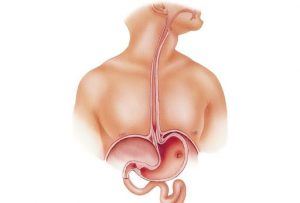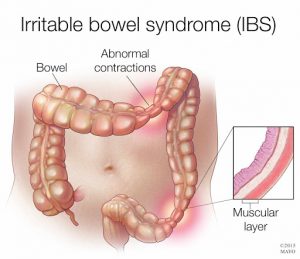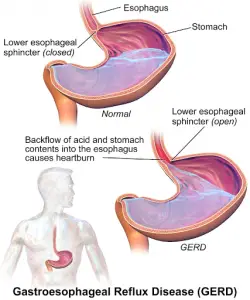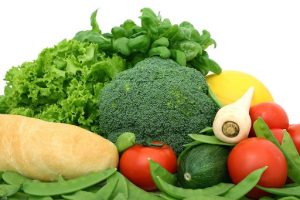Can a Plant-based Diet Help with IBS, Acid Reflux, and GERD?
Irritable bowel syndrome (IBS), acid reflux, and Gastroesophageal reflux disease (GERD) are common gut conditions that may result from your diet. To treat these conditions, doctors often prescribe certain diets, including a plant-based one. So can plant-based diet help with IBS, acid reflux, and GERD?

All three of these conditions are fairly common in the US. For instance, 10 to 15 percent of all adult population in the US is estimated to have IBS, according to the American College of Gastroenterology. GERD apparently affects 20% of the population in the US, according to the National Institute of Health.
These gut conditions can negatively impact one’s lifestyle and may even lead to even more serious conditions. Poor diet plays an important role in causing these three conditions. Similarly, a healthy diet like a plant-based diet helps reverse the damage and fix the problem. There are many studies that support a plant-based lifestyle for treating IBS, acid reflux, and GERD.
What is IBS?
Irritable bowel syndrome or IBS, as the name indicates, is a condition that affects your colon (large intestine). It’s a common chronic condition, which means that it may last a lifetime and needs constant treatment. 
The symptoms and signs can range from mild to severe. Most commonly, it’s treated through diet and lifestyle changes, and in severe cases, through medication as well. IBS affects women more than it does men, so gender also is a risk factor.
IBS Symptoms
The common IBS signs and symptoms include:
- Abdominal pain
- Bloating and gas
- Cramps
- Diarrhea or constipation
The symptoms may not appear continuously, as they occur periodically and go away on their own sometimes. Also, diarrhea or constipation can occur alternately.
IBS Causes
There are various causes behind IBS and risk factors as well. However, the exact cause behind this condition is hard to pinpoint. The suspected causes of this condition include:
Change in microflora (gut bacteria): Changes in the good bacteria in your gut can result in IBS. People with IBS have different microflora than those with a healthy gut.
Nervous system: Some abnormality in the nerves of the digestive system is linked with the symptoms of IBS. If your nerves are not functioning properly, it may cause pain and bloat in the colon.
Infection: A very severe infection from bacteria or viruses may also lead to IBS. Severe bouts of diarrhea may be followed by other symptoms of IBS.
Muscle contractions: Unusually strong contractions or weakened contractions can result in bloating and gas.
Other than the causes, there are certain triggers as well that cause the aggravate or activate the symptoms if you have IBS. These triggers include:
- Foods, such as processed foods, dairy, citrus fruits, and beans
- Stress, anxiety, and depression
- Hormonal changes
What is Acid Reflux?
Acid reflux occurs when the acid from your stomach moves back into the esophagus. A small muscle named lower esophageal sphincter (LES) keeps the contents of the stomach from coming up. When it’s weak, it can flow back up, causing heartburn.
Heartburn is a pain in the lower chest and often confused with acid reflux. It’s a symptom of acid reflux. Other signs include:
- Sore throat
- Cough
- Bitter taste
- Burning and pressure sensation in the chest
Note: Acid reflux is often confused with GERD. While GERD also involves acid reflux, it’s a chronic disease.
What is GERD?
Gastroesophageal reflux disease or GERD is a more severe and chronic form of acid reflux. Usually, if the acid reflux occurs more than twice a week, it’s considered GERD.

GERD can be mild or severe and may be managed by lifestyle changes and some over-the-counter medications. However, some people may need stronger medication if their symptoms are more severe.
It’s important to treat it because the esophagus does not have the protective lining to withstand the strong stomach acids. It can result in permanent damage.
GERD Symptoms
GERD’s signs and symptoms are similar to that of acid reflux, which is why people often don’t realize that they actually have GERD.
- Heartburn
- Difficulty swallowing
- Chronic cough
- Regurgitation of food
- Sleep disruption
GERD Risk Factors
GERD basically occurs through frequent acid reflux. Certain conditions can increase the risk of this chronic condition.
Obesity: Obesity is positively linked with GERD, as all that extra weight can put pressure on the stomach.
Hiatal Hernia: This involves the bulging of the stomach into the diaphragm, reducing pressure in LES.
Pregnancy: Pregnant women have a higher risk of GERD.
Medications: Certain medications can cause acid reflux as a side-effect and increase the risk of developing GERD.
Smoking: Tobacco smoking, even secondhand smoke, increases the risk of GERD.
While the above factors increase the risk, certain things can aggravate the condition. This includes drinking alcohol, smoking, eating fried foods, eating too much food, or eating late at night.
Can a Plant-based Diet Help with IBS, Acid Reflux, and GERD?
A plant-based diet can benefit your gut health in so many ways. It’s safe to say that this diet, rich in whole foods, whole grains, nuts, and seeds, can positively impact people with common digestive conditions such as IBS, acid reflux, and GERD.

There’s a plethora of research that shows that animal products, mainly red meat, can cause and exacerbate these digestive issues. A plant-based diet, which is devoid of any animal products, does the opposite. It nourishes your gut microbiome, fights inflammation, and regulates bowel movement to give you a healthy and active digestive system.
IBS
Health experts recommend people with IBS to increase fiber in their diet. Lack of fiber is often the cause behind IBS in the first place, so increasing it can help manage the symptoms. However, research is showing that fiber does way more than just increase fecal mass and stop diarrhea.
This research paper, out of the International Journal of Molecular Medicine, explored in detail the role of fiber in treating IBS. It concluded that fiber, in general, is good for treating IBS, but some fibers are even more efficient. Long-chain, soluble, and easily fermentable fiber, such as psyllium is better for patients with IBS as it does not cause bloating or gas.
Furthermore, this research paper asserts that fiber also promotes healthy microbiota, builds a stronger immune system, and improves the neuroendocrine system. So fiber treats this condition in more than one way.
A plant-based diet is inherently fibrous, containing whole foods that provide you the daily recommended fiber intake. Currently, most Americans are not even getting half of the required daily fiber intake. A plant-based diet can change that by introducing more fiber in your diet.
Vegetables, fruits, whole grains, and beans, in particular, contain a lot of fiber. However, if you do have IBS, you have to slowly transition to a diet rich in fiber. Starting heavy on fiber-rich foods may elevate symptoms initially and cause abdominal pain and gas. If you take it slow, one day at a time, you can really use the fiber to make a difference and get your life back on track.
Acid Reflux
A lot of people think acid reflux and GERD are the same, but they are not. That said, a plant-based diet is good for both. Let’s talk about acid reflux first, as it’s more common than GERD. It’s a problem that ever so often goes wrongly diagnosed or ignored altogether.
A 2017 JAMA Network study compared the effects of a diet with that of medication for treating acid reflux. The results showed that dietary changes such as going plant-based resulted in better results than medication. In this study, 63 percent of the people with acid reflux problems who were eating a plant-based diet saw their symptoms improve significantly. In comparison, the percentage of people seeing an improvement in symptoms through medication was 54 percent.
So how does it do that? For one, a plant-based diet does not contain any animal fats and dairy, which can result in gas and increase the exposure of the esophagus with acids. But what really helps is, again, dietary fiber.
Dr. Michael Greger of NutrionFacts.org explains in this article how dietary fiber is at the very heart of acid reflux. It may prevent it and also treat it by preventing and treating hiatal hernia. He explains that a diet rich in fat and animal protein may strain bowel movement, and increase pressure in the abdominal cavity. This results in the stomach protruding up towards the diaphragm and causing reflux.
GERD
If a plant-based diet is so good for treating common acid reflux, it may also help with GERD, which is a much more serious condition. GERD can dramatically reduce the quality of life, so it’s important to manage the symptoms. More importantly, you need to prevent the complications that come with this disease.

In this video, Dr. Michael Greger discusses how a plant-based diet helps with GERD and compares it with the standard Western diet. It’s clear that animal products can cause and exacerbate GERD, as proven by many studies conducted all over the world. In comparison, a plant-based diet, rich in fiber, reduced the symptoms, especially heartburn.
What is even more consequential is the protective effect of a plant-based diet against cancer. The antioxidants in plant-based foods can reduce the risk of cancer, including esophageal cancer.
GERD can increase the risk and cause esophageal cancer. Therefore by shifting to a plant-based diet, not only do you reduce and control the symptoms, but you also protect yourself from the complications that come with GERD.
Acid Reflux Trigger Foods
Whether you have simple acid reflux or GERD, some foods can trigger heartburn and regurgitation. Even some plant-based foods that are acidic in nature make the cut. You can work your way to including these foods in your diet, but only in limits. In the beginning, avoid these trigger foods at all when you’re transitioning to a plant-based diet.
Some acid reflux trigger foods include:
- Tomato
- Garlic
- Onion
- Citrus fruits
- Mint
- Chocolate
High-fat foods also trigger acid reflux, but you’d be avoiding them anyways on a plant-based diet. Fats in plant-based foods, such as olive oil or avocados, are super healthy and may not trigger symptoms of GERD.
Can IBS Go Away?
IBS is incurable per se, but if you can manage the symptoms, you can get your life back to how it was without it. You can make significant strides in this regard with your lifestyle, but those changes will have to be permanent. You’ll have to avoid trigger foods and activities.
There are success stories when it comes to treating IBS. With a strong commitment to a whole-food, plant-based diet, you can even get off any medications. Exercise may also help, but be mindful that some exercise may increase the symptoms. It’s best to work with your doctor or a fitness expert on which exercises are safe for you.

Is GERD Curable?
GERD is not so much curable as it’s manageable. In other words, you may just be able to live with it without the symptoms affecting your life. GERD causes ER visits and hospitalizations when the symptoms get too severe. That’s why it’s important to make sustainable changes in your lifestyle that help manage the symptoms.
People on a plant-based diet have successfully almost-cured GERD. Real-life examples show that it’s possible to manage the symptoms and avoid complications. GERD can also be treated with medication, but those medications can have side-effects, so the best way to treat it is to make healthy lifestyle changes.
Wrap Up
So can plant-based diet help with IBS, acid reflux, and GERD? Absolutely! It may just be the best option for treating these common gut conditions. This diet contains all the right nutrients that work to manage the symptoms. Even if you can’t totally cure the condition like IBS or GERD, you can significantly improve the quality of life by avoiding all the symptoms.
You’ll learn gradually what works best and what triggers your symptoms until you have a system. Besides, a plant-based diet will not only help with these conditions, but it will also protect you from life-threatening diseases such as heart disease, kidney disease, and stroke.
You may also like: IS A PLANT-BASED DIET GOOD FOR GUT HEALTH? >>CLICK HERE!










